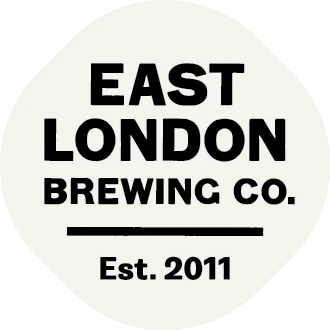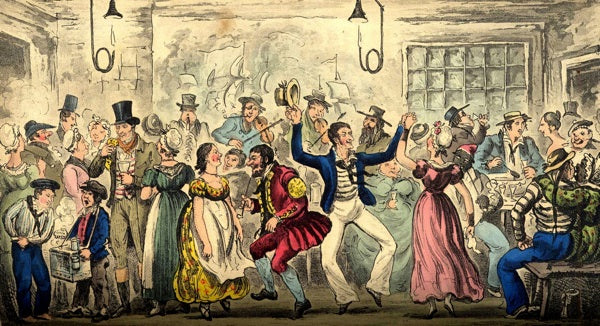THE LANGUAGE OF BEER
by The Gentle Author
You can read my stories daily at www.spitalfieldslife.com or join one of my celebrated tours of Spitalfields at www.thegentleauthorstours.com
It is my delight to present this collection of specialist lingo associated with an area of passionate interest for me – pubs and beer – and so I offer this selection today lest it may be of use to any reader who might be planning to pay a visit to their local.

Illustration: Life in the East – At the Half Moon Tap, 1830, from Tom & Jerry’s Life in London, courtesy Bishopsgate Institute
Barrel – A cask built to hold thirty-six gallons.
Beer – There is no bad beer but some is better than others.
Binder – The last drink, which it seldom proves to be. Also used to describe the person who orders it.
Boiling Copper – Vessel in which wort is boiled with hops.
Boniface – Traditional name for an innkeeper, as used by George Farquhar in ‘The Beaux’ Stratagem.’
Bragget – A fancy drink made of fermented honey and ale.
Brewer – The artist who by his choice of barley and other ingredients, and by his sensitive control of the brewing process, produces beer the way you like it.
Butt – A cask built to hold one hundred and eight gallons.
Buttered Beer – A popular sixteenth century drink of spiced and sugared strong beer supplemented with the yolk of an egg and some butter.
Cardinal – A nineteenth century form of mulled ale.
Casual – An occasional visitor to the pub.
Cheese – A heavy wooden ball used in the game of skittles.
Chitting – The appearance of the first shoots while the barley is growing during the first stage of the malting process.
Coaching Glass – An eighteenth century drinking vessel with no feet that was brought out to coach travellers and consumed at one draught.
Collar – The frothing head on a glass of beer between the top of the beer and the rim of the glass.
Crinze – An earthenware drinking vessel, a cross between a tankard and a small bowl.
Crawler – One who visits all the pubs in one district, drinking a glass of beer in each.
Dipstick – An instrument used to measure the quantity of wort prior to fermentation.
Dive – A downstairs bar.
Dog’s Nose – Beer laced with gin.
Down The Hatch – A toast, usually for the first drink.
Finings – A preparation of isinglass which is added to the beer in the cask to clarify it.
Firkin – A cask built to hold nine gallons.
Flip – Beer and spirit mixed, sweetened and heated with a hot iron.
Fob – The word used in a brewery to describe beer froth.
Goods – The name used by the brewer to describe the crushed malted grains in the mash tuns.
Grist – Malt grains that have been cleaned and cracked in the brewery mill machines.
Gyle – A quality of beer brewed at one time – one particular brewing.
Heel Tap – Term for beer left at the bottom of the glass.
Hogshead – A cask built to hold fifty-four gallons.
Hoop – A device displayed outside taverns in the middle ages to indicate that beer was sold. Later, it became the practice to display certain objects within the hoop in order to differentiate one tavern from another. eg The Hoop & Grapes
Kilderkin – Cask holding eighteen gallons.
Lambswool– A hot drink of spiced ale with roasted apples beaten up in it.
Liquor – The term used in the brewing industry for water.
Local – The pub round the corner.
Long Pull – Giving the customer more than they ordered, the opposite of a short pull.
Lounge – The best-appointed and most expensive bar of the public house.
Mash – The mixture of crushed malted grains and hot liquor which is run through the masher into the mash tun and from which is extracted liquid malt or wort.
Merry-Goe-Down – Old term describing good ale.
Metheglin – A spiced form of mead.
Mether Cup – A wooden drinking cup used by the Saxons, probably for Metherglin.
Mud-In-Your-Eye, Here’s – Traditional toast, with a meaning more pleasant than it sounds.
Nappy – Term describing good ale, foaming and strong.
Noggin – Small wooden mug, a quarter pint measure.
Noondrink – Ale consumed at noon when trade was slacker. Also, High Noon, drunk at three o’clock when street trading was finished.
One For The Road – Last drink before leaving the pub.
Pig’s Ear – Rhyming slang for beer.
Pocket – A large sack made to contain one and a half hundredweight of hops.
Porter – Popular in the late eighteenth and nineteenth centuries among London market porters, equivalent to a mixture of ale, beer and twopenny.
Public Bar – Where everything is cheapest and decoration and equipment is smiplest.
Puncheon – Cask built to hold seventy-two gallons.
Quaff – To drink in large draughts.
Regular – One of the mainstays of the public house.
Round – An order of drinks for more than one person.
Saloon Bar – Enjoying better amenities than a Public Bar and therefore more expensive to the customer.
Shandy – A drink of beer mixed with ginger beer, or sometimes beer and lemonade.
Short – A gin or whisky, usually taken before a meal.
Small Beer – A beer of lesser gravity, hence a trifling matter.
Smeller – A man employed in the brewery to examine casks after they have been washed and prior to their being filled with beer.
Snifter – Colloquial term for a drink.
Snug or Snuggery – Semi-private apartment in the pub, by custom reserved for use of the regulars.
Sparge – To spray hot liquor onto the grist in the mash tuns.
Spell, To Take A – To go round to the local for a beer, coined by Mr Peggotty in David Copperfield.
Stingo – A strong ale, similar to Barley Wine, popular during the winter months and usually sold in a bottle.
Stool – A useful piece of furniture for a customer who wants to stay at the bar, but is anxious to sit down.
Swig – To take a draught of beer, generally a large one.
Thirst – Suffering enjoyed by beer drinkers.
Tipple – To drink slowly and repeatedly.
Trouncer – The drayman’s mate who pushed and manhandled the wagon over potholes.
Tumbler – A flat bottomed drinking glass, derived from the Saxon vessel that could not stand upright and must be emptied in one draught.
Tun – Vessel in the brewery where the fermenting takes place.
Twopenny – A pale, small beer introduced to London from the country in the eighteenth century at fourpence a quart.
Wallop – Mild ale.
Wassail – Hot ale flavoured with sugar, nutmeg and roasted apples.
What’s Yours? – An invitation which sums up the companionable atmosphere of a public house.
Wort – The solution of mash extract in water, derived from the grist in the mash tuns.

